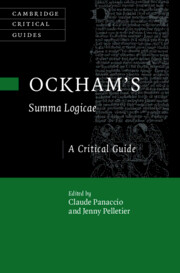Book contents
- Frontmatter
- Contents
- Contributors
- Abbreviations of Ockham’s Works
- Introduction
- Chapter 1 Metaphysical Methodology in Ockham’s Summa Logicae I
- Chapter 2 Ockham and Syncategoremata
- Chapter 3 Ockham on Metalanguage
- Chapter 4 Ockham’s Moderate Modism
- Chapter 5 Relations in Summa Logicae
- Chapter 6 The Threat of Pernicious Ambiguity
- Chapter 7 Ontology and Ockham’s Account of Truth Conditions for Tensed Propositions
- Chapter 8 Ockham’s Theory of the Categorical Syllogism
- Chapter 9 Ockham’s Modal Logic
- Chapter 10 Theory of Demonstration
- Chapter 11 The Obligationes of William of Ockham
- Chapter 12 Ockham on the Liar Paradox
- Chapter 13 Ockham on Figurative Discourse
- Bibliography
- Index
- Cambridge Critical Guides
Introduction
Published online by Cambridge University Press: 04 September 2025
- Frontmatter
- Contents
- Contributors
- Abbreviations of Ockham’s Works
- Introduction
- Chapter 1 Metaphysical Methodology in Ockham’s Summa Logicae I
- Chapter 2 Ockham and Syncategoremata
- Chapter 3 Ockham on Metalanguage
- Chapter 4 Ockham’s Moderate Modism
- Chapter 5 Relations in Summa Logicae
- Chapter 6 The Threat of Pernicious Ambiguity
- Chapter 7 Ontology and Ockham’s Account of Truth Conditions for Tensed Propositions
- Chapter 8 Ockham’s Theory of the Categorical Syllogism
- Chapter 9 Ockham’s Modal Logic
- Chapter 10 Theory of Demonstration
- Chapter 11 The Obligationes of William of Ockham
- Chapter 12 Ockham on the Liar Paradox
- Chapter 13 Ockham on Figurative Discourse
- Bibliography
- Index
- Cambridge Critical Guides
Summary
In this introduction, we first describe the contents of the Summa Logicae in some detail, situating the work in the larger context of medieval logical texts of the thirteen and fourteenth centuries and explaining why it occupies pride of place in Ockham’s philosophical project. Second, we argue that the Summa Logicae was most likely composed in Avignon between 1324 and 1328 contrary to the accepted view that Ockham wrote it in London over the summer of 1323. Third, we trace the legacy of the Summa Logicae from its first reception in Oxford and Paris in the 1330s, into the Parisian controversies of the 1330s and 1340s, and its dissemination further into Europe over the course of the next century or so. We end this history by noting the 1974 publication of the modern critical edition of the Summa Logicae, which was an enormously significant landmark in Ockham studies.
Information
- Type
- Chapter
- Information
- Ockham’s Summa LogicaeA Critical Guide, pp. 1 - 18Publisher: Cambridge University PressPrint publication year: 2025
